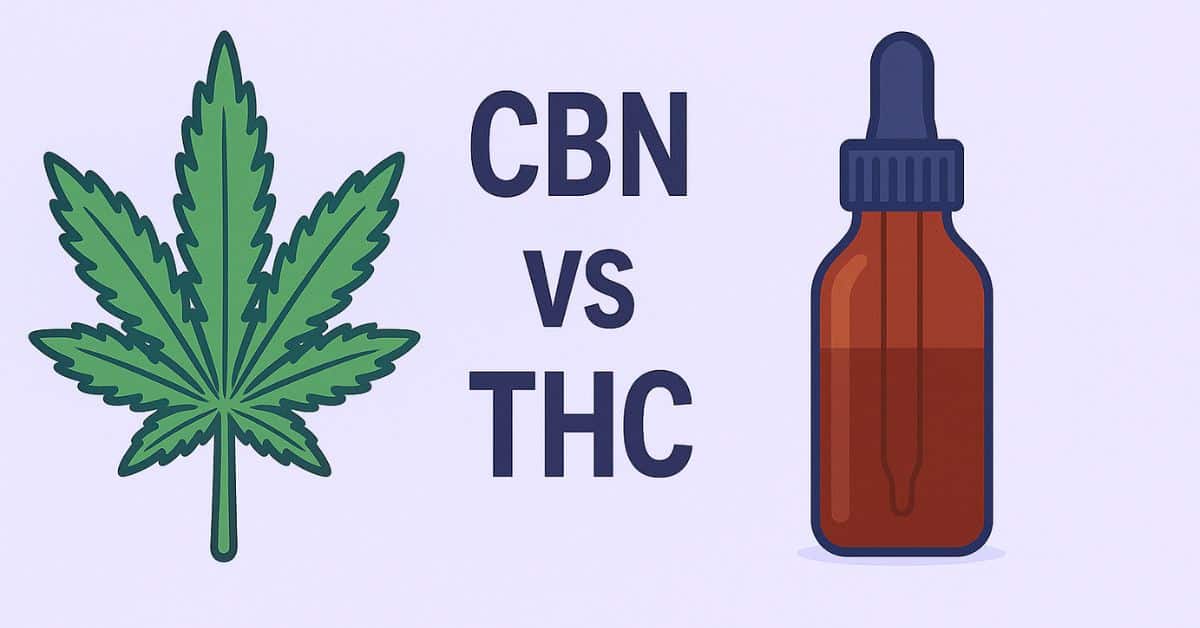CBN vs THC is a common comparison for anyone exploring cannabinoids, and while they come from the same plant, their effects couldn’t be more different. THC is the well-known compound that produces the cannabis “high,” while CBN is a gentler, sleep-focused cannabinoid that forms as THC ages.
What Is CBN?
CBN, or cannabinol, is a minor cannabinoid that develops when THC is exposed to heat, light, and oxygen over time. It is only mildly psychoactive, meaning it has a very low potential to cause intoxication.
CBN is most associated with relaxation and sleep. Many people use CBN gummies, oils, or capsules at night to help them unwind.
What Is THC?
THC, or tetrahydrocannabinol, is the main psychoactive cannabinoid in cannabis. It binds directly to CB1 receptors in the brain, producing euphoria, relaxation, altered perception, and changes in mood.
Beyond recreational use, THC is also used medicinally for pain relief, appetite stimulation, and nausea reduction. However, because THC alters mental state, it is regulated more strictly in most countries, including Canada.
How CBN and THC Are Related
CBN is essentially an aged form of THC. When cannabis is stored for long periods, the THC inside gradually oxidizes and converts into CBN.
Fresh cannabis tends to have high THC and low CBN. Older cannabis or cannabis exposed to air and light has lower THC and higher CBN content.
Effects of CBN vs THC
CBN effects are typically relaxing, calming, and mildly sedating. Most people take it at night or during times of rest. It does not cause a noticeable high, making it appealing for those who want the benefits of cannabis without strong psychoactive effects.
THC effects are much stronger and include euphoria, altered perception, heightened senses, relaxation, and, in some cases, anxiety or paranoia. The experience depends heavily on dosage, strain, and personal tolerance.
Can You Take CBN and THC Together?
Yes. In fact, some sleep-focused cannabis products in Canada include both THC and CBN in small, balanced amounts. The idea is that THC helps you fall asleep faster while CBN helps you stay asleep longer.
This combination may be beneficial for some people, but it’s important to start with low doses, especially with THC, and monitor how your body reacts.
If your goal is to avoid the high entirely, stick with pure CBN products that contain no THC or only trace amounts.
Which is Better for Sleep?
For most people, CBN is a better choice for sleep. It’s calming, promotes relaxation, and doesn’t produce the intense mental effects of THC. Many sleep-focused products combine CBN with CBD or melatonin for a stronger effect.
THC can help with sleep for some, especially in small doses, but high doses may disrupt REM cycles or cause grogginess the next day.
Which is Better for Pain Relief?
THC is generally more effective for strong pain relief, especially for neuropathic pain, arthritis, and muscle spasticity. It interacts with the body’s endocannabinoid system in a way that can significantly reduce discomfort.
CBN may provide mild pain relief and anti-inflammatory benefits, but it is typically used in combination with other cannabinoids for stronger effects.
Legal Status in Canada
Both CBN and THC are legal in Canada under the Cannabis Act, but they are regulated differently. THC-containing products are sold only through licensed retailers and have strict limits on potency, packaging, and marketing.
Will CBN or THC Make You High?
THC will cause a high in moderate to large doses, and even small amounts can be intoxicating for new users.
CBN is unlikely to produce a high. Most people feel calm or sleepy without mental impairment.
Side Effects of CBN vs THC
CBN side effects may include drowsiness or mild grogginess, especially if taken in large amounts.
THC side effects can include dry mouth, red eyes, increased heart rate, impaired memory, poor coordination, and anxiety or paranoia in sensitive users.
FAQ
CBN is mildly psychoactive and mostly used for relaxation and sleep, while THC is strongly psychoactive and produces a high.
Yes, when derived from licensed hemp. THC is also legal but under stricter regulations.
Yes, CBN is created when THC ages and oxidizes.
CBN is preferred for sleep as it calms without intoxication.
THC is more potent for pain relief, while CBN provides mild benefits.
Bottom Line
CBN is your go-to for relaxation and sleep without a high. THC delivers stronger effects, including euphoria and more powerful pain relief. Use CBN when you want calm clarity, and THC when you want a stronger, mind-altering experience.

